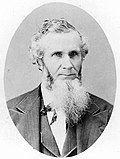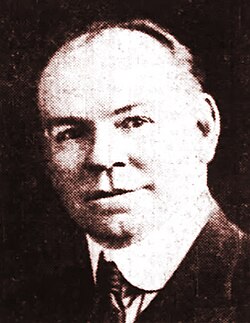| No. | Portrait | Name District | Session | Party |
|---|
| 1 |  | William G. T'Vault Jackson County | 1859 Sp. | Democratic |
| 2 |  | Benjamin F. Harding Marion County | 1860 | Democratic |
| 3 |  | Joel Palmer Yamhill County | 1862 | Republican |
| 4 | | Isaac R. Moores Jr. Marion County | 1864
1865 | Republican |
| 5 | | Francis A. Chenoweth Benton County | 1866 | Republican |
| 6 |  | John Whiteaker Lane County | 1868 | Democratic |
| 7 |  | Benjamin Hayden Polk County | 1870 | Democratic |
| 8 |  | Rufus Mallory Marion County | 1872 | Republican |
| 9 | | John C. Drain Douglas County | 1874 | Democratic |
| 10 |  | James K. Weatherford Linn County | 1876 | Democratic |
| 11 | | John M. Thompson Lane County | 1878 | Democratic |
| 12 |  | Zenas Ferry Moody Wasco County | 1880 | Republican |
| 13 |  | George W. McBride Columbia County | 1882 | Republican |
| 14 | | W. P. Keady (1st term) Benton County | 1885 | Republican |
| 15 | | J. T. Gregg Marion County | 1887 | Republican |
| 16 | | E. L. Smith Hood River County | 1889 | Republican |
| 17 |  | Theodore Thurston Geer Marion County | 1891 | Republican |
| 14 | | W. P. Keady (2nd term) Multnomah County | 1893 | Republican |
| 18 |  | Charles B. Moores Marion County | 1895 | Republican |
| |
| 19 | | E. V. Carter Jackson County | 1898 Sp.
1899 | Republican |
| 20 |  | Levi Branson Reeder Umatilla County | 1901 | Republican |
| 21 |  | Lawrence T. Harris Lane County | 1903 | Republican |
| 22 | | A. L. Mills Multnomah County | 1905 | Republican |
| 23 | | Frank Davey Marion County | 1907 | Republican |
| 24 |  | Clifton N. McArthur (1st term) Multnomah County | 1909
1909 Sp. | Republican |
| 25 |  | John P. Rusk Wallowa County | 1911 | Republican |
| 24 |  | Clifton N. McArthur (2nd term) Multnomah County | 1913 | Republican |
| 26 |  | Ben Selling Multnomah County | 1915 | Republican |
| 27 |  | Robert N. Stanfield Umatilla County | 1917 | Republican |
| 28 |  | Seymour Jones Marion County | 1919
1920 | Republican |
| 29 | | Louis E. Bean Lane County | 1921
1921 Sp. | Republican |
| 30 |  | Kaspar K. Kubli Multnomah County | 1923 | Republican |
| 31 |  | Denton G. Burdick Deschutes County | 1925 | Republican |
| 32 |  | John H. Carkin Jackson County | 1927 | Republican |
| 33 | | R. S. Hamilton Deschutes County | 1929 | Republican |
| 34 |  | Frank J. Lonergan Multnomah County | 1931 | Republican |
| 35 |  | Earl Snell Gilliam County | 1933
1933 Sp. | Republican |
| 36 | | John E. Cooter Lincoln County | 1935 | Democratic |
| 37 | | Howard Latourette Multnomah County | 1935 Sp. | Democratic |
| 38 | | Harry D. Boivin Klamath County | 1937 | Democratic |
| 39 | | Ernest R. Fatland Gilliam County | 1939 | Republican |
| 40 | | Robert S. Farrell Jr. Multnomah County | 1941 | Republican |
| 41 |  | William M. McAllister Jackson County | 1943 | Republican |
| 42 | | Eugene E. Marsh Yamhill County | 1945 | Republican |
| 43 |  | John Hubert Hall Multnomah County | 1947 | Republican |
| 44 | | Frank J. Van Dyke Jackson County | 1949 | Republican |
| 45 |  | John F. Steelhammer Marion County | 1951 | Republican |
| 46 | | Rudie Wilhelm, Jr. Multnomah County | 1953 | Republican |
| 47 | | Edward A. Geary Klamath County | 1955 | Republican |
| 48 | | Pat Dooley Multnomah County | 1957
1957 Sp. | Democratic |
| 49 |  | Robert B. Duncan Jackson County | 1959
1961 | Democratic |
| 50 | | Clarence Barton Coos County | 1963
1963 Sp. | Democratic |
| 51 | | Monte Montgomery Lane County | 1965
1965 Sp.
1967
1967 Sp. | Republican |
| 52 |  | Bob Smith Harney County | 1969
1971
1971 Sp. | Republican |
| 53 | | Richard O. Eymann Lane County | 1973
1974 | Democratic |
| 54 | | Phil Lang 10 - Portland | 1975
1977
1978 Sp. | Democratic |
| 55 | | Hardy Myers 19 - Portland | 1979
1980 Sp.
1981
1981 Sp. | Democratic |
| 56 |  | Grattan Kerans Lane County | 1983
1983 Sp. | Democratic |
| 57 |  | Vera Katz 8 - Portland | 1985
1987
1989
1989 Sp. | Democratic |
| 58 | | Larry Campbell 43 - Eugene | 1991
1993 | Republican |
| 59 |  | Bev Clarno 55 - Bend | 1995
1995 Sp. | Republican |
| 60 | | Lynn Lundquist 59 - Powell Butte | 1997 | Republican |
| 61 | | Lynn Snodgrass 10 - Boring | 1999
1999 Sp. | Republican |
| 62 | | Mark Simmons 58 - Elgin | 2001
2001 Sp. | Republican |
| 63 | | Karen Minnis 49 - Fairview | 2003
2005 | Republican |
| 64 |  | Jeff Merkley 49 - Portland (Mill Park) | 2007 | Democratic |
| 65 |  | Dave Hunt 40 - Gladstone | 2009 | Democratic |
| 66 |  | Arnie Roblan (Co-speaker) 9 - Coos Bay | 2011 | Democratic |
| 66 |  | Bruce Hanna (Co-speaker) 7 - Roseburg | 2011 | Republican |
| 67 |  | Tina Kotek 49 - Portland (Kenton) | 2013
2015
2017
2019
2021 | Democratic |
| 68 |  | Dan Rayfield 16 - Corvallis | 2022 Sp.
2023 | Democratic |
| 69 |  | Julie Fahey 14 - Eugene | 2025 | Democratic |






































